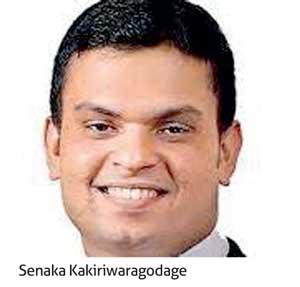17 Sep 2021 - {{hitsCtrl.values.hits}}
While the reset in the monetary and fiscal policies and, structural reforms such as import substitution and export promotion would provide a medium to long-term fix to the current external sector woes confronting the Sri Lankan economy, a quick fix could come from an asset sale which would infuse a couple of billions dollars, instantly boosting market confidence, according to an investment banker.
According to Senaka Kakiriwaragodage, the Chief Executive Officer at NDB Capital Holdings Limited, a sale of public assets in return for a couple of billions worth of dollars would quickly strengthen the depleted foreign reserves in the country while instilling the much needed confidence in the domestic foreign currency market.
“One other solution I would like to add probably is some form of asset sale because the market needs quick solutions given the current situation,” Kakiriwaragodage said last week speaking at the September edition of Postgraduate Institute of Management’s online forum, which was dedicated to discuss about the current foreign exchange situation in the country and the way out.
“I think probably you need to shore up that reserves position by a couple of billion dollars. I think it will infuse a lot of confidence to the market,” he added.
Sri Lanka at present is facing the most acute shortage of foreign currency in its recent history due to drying up of key foreign exchange inflows from tourism, direct investments and easing of merchandise exports caused by pandemic-induced disruptions.
In an attempt to arrest the situation to a certain degree, the Central Bank last week fixed the exchange rate at Rs.200/Rs.203 to a dollar and imposed a mandatory 100 percent cash margin deposit requirement when importing some 623 products which they deem as non-essential to restrain imports of speculative nature.
According to Senaka Kakiriwaragodage, the Chief Executive Officer at NDB Capital Holdings Limited, a sale of public assets in return for a couple of billions worth of dollars would quickly strengthen the depleted foreign reserves in the country while instilling the much needed confidence in the domestic foreign currency market.
“One other solution I would like to add probably is some form of asset sale because the market needs quick solutions given the current situation,” Kakiriwaragodage said last week speaking at the September edition of Postgraduate Institute of Management’s online forum, which was dedicated to discuss about the current foreign exchange situation in the country and the way out.
“I think probably you need to shore up that reserves position by a couple of billion dollars. I think it will infuse a lot of confidence to the market,” he added.
Sri Lanka at present is facing the most acute shortage of foreign currency in its recent history due to drying up of key foreign exchange inflows from tourism, direct investments and easing of merchandise exports caused by pandemic-induced disruptions.
In an attempt to arrest the situation to a certain degree, the Central Bank last week fixed the exchange rate at Rs.200/Rs.203 to a dollar and imposed a mandatory 100 percent cash margin deposit requirement when importing some 623 products which they deem as non-essential to restrain imports of speculative nature.
However, these actions further weakened the confidence the participants had on the foreign exchange market as they remain in the sidelines without engaging, further exacerbating market woes.
 Divestment of non-strategic State-owned assets has been a part of the government’s multi-pronged agenda in the short-term to both improve their operational and financial efficiency while shoring up the country’s reserves position, which dwindled in July to its post-war low before recouping to US$ 3.6 billion in August.
Divestment of non-strategic State-owned assets has been a part of the government’s multi-pronged agenda in the short-term to both improve their operational and financial efficiency while shoring up the country’s reserves position, which dwindled in July to its post-war low before recouping to US$ 3.6 billion in August.
While such a structural reform is one that is long overdue in Sri Lanka, that has been the most difficult politically, given the fake national interests entrenched in the Sri Lankan polity and its most opportunistic partisan politics played by both sides in the isle, which have successfully engulfed the Sri Lankan system with lethargy, inefficiency, bribery, corruption and waste of public resources for generations.
“Asset sale is something probably not the politically most preferred solution but I guess you have to do it. Anyway even if you go for IMF kind of solution, some form of asset sale in a different form - may be in the privatisation form - may come,” Kakiriwaragodage said.
“ think these are long overdue reforms in the economy. The more public assets you carry, eventually they may turn up to be public liabilities eating up into taxes,” he added.
18 Nov 2024 8 minute ago
18 Nov 2024 10 minute ago
18 Nov 2024 10 minute ago
18 Nov 2024 11 minute ago
18 Nov 2024 15 minute ago